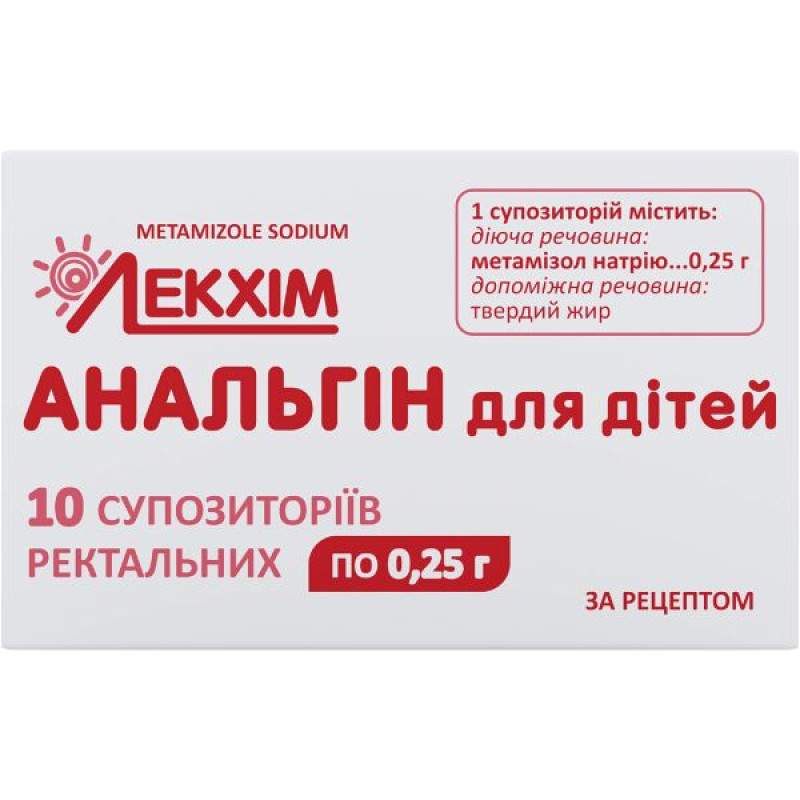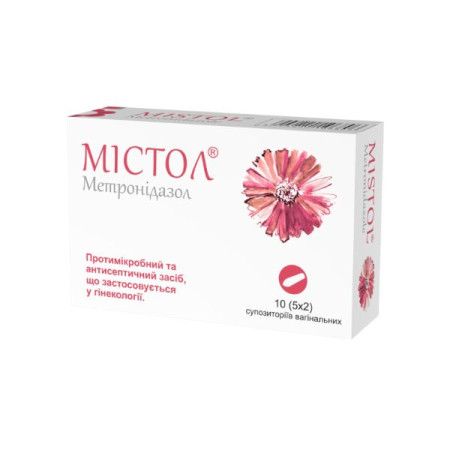Analgin for children rectal suppositories 0.25 g blister No. 10

Analgin for children is a non-narcotic analgesic-antipyretic for the treatment of pain of various origins (headache, pain from burns, neuralgia, radiculitis, myositis, pain in the postoperative period), high body temperature.
Composition
active ingredient: metamizole sodium; 1 suppository contains metamizole sodium 250 mg (0.25 g); excipient: solid fat.Contraindication
The use of Analgin suppositories is contraindicated in children under 1 year of age, with hypersensitivity to the drug, which manifests itself in the form of skin and other reactions, with bronchospasm, with severe liver and kidney dysfunction, agranulocytosis, leukopenia, anemia of any etiology, cytostatic or infectious neutropenia; rhinitis, conjunctivitis or bronchospasm when taking nonsteroidal anti-inflammatory drugs, bronchial asthma, porphyria; suspicion of acute surgical pathology; hypersensitivity to pyrazolone derivatives (butadione, tribuzone, antipyrine), hereditary hemolytic anemia associated with glucose-6-phosphate dehydrogenase deficiency.
Method of application
Before using the suppository, you must:
Tear off one suppository from the primary packaging along the perforation line of the blister package; then pull the edges of the film, tearing it in different directions, and release the suppository from the primary packaging.The drug is intended for rectal use.
Children aged 1 to 3 years – 1 suppository 100 mg once a day;
from 4 to 7 years old – 1 suppository of 100 mg 2 times a day no more often than every 4-6 hours or 1 suppository of 250 mg 1 time a day;
from 8 to 14 years old – 1 suppository 250 mg 1-2 times a day no more often than every 4-6 hours.
After using the suppository, the child must remain lying down for 30 minutes.
The duration of treatment is determined individually and ranges from 1 to 3 days.
Application features
It is necessary to monitor the qualitative and quantitative composition of peripheral blood. If an unmotivated increase in temperature, chills, sore throat, difficulty swallowing, stomatitis, or the development of vaginitis or proctitis occurs, the drug should be discontinued immediately.
Do not use the drug to relieve acute abdominal pain (until the cause is determined).
Use with caution in kidney diseases (pyelonephritis, glomerulonephritis), allergic diseases.
When using Analgin, urine may turn red due to the excretion of a metabolite.
Regular long-term use of the drug is not recommended due to the myelotoxicity of metamizole sodium salt.
Use during pregnancy or breastfeeding
The drug is contraindicated during pregnancy.
Breastfeeding should be discontinued during treatment.
Children
Use for children over 1 year of age.
When used in children, constant medical supervision should be carried out.
Ability to influence reaction speed when driving vehicles or other mechanisms
Does not affect.
Overdose
Symptoms: hypothermia, palpitations, pronounced decrease in blood pressure, tachycardia, dysphagia, shortness of breath, tinnitus, nausea, vomiting, gastralgia/gastritis, weakness, drowsiness, delirium, impaired consciousness, convulsive syndrome; possible development of acute agranulocytosis, hemorrhagic syndrome, oliguria, anuria, acute renal or hepatic failure, paralysis of the respiratory muscles.
Treatment: drug withdrawal, induction of vomiting, gastric lavage, administration of saline laxatives, enterosorbents, forced diuresis, symptomatic therapy aimed at supporting vital functions. In severe cases, hemodialysis, hemoperfusion, peritoneal dialysis are possible.
At the first symptoms of overdose, you should immediately seek medical help!
Adverse reactions
Allergic reactions: possible manifestations of hypersensitivity reactions, including rashes on the skin and mucous membranes, conjunctivitis, skin hyperemia, itching, urticaria, angioedema, bronchospastic syndrome, anaphylactic shock, Stevens-Johnson syndrome, Lyell syndrome.
On the part of the blood: leukopenia, anemia, thrombocytopenia, granulocytopenia, agranulocytosis.
From the urinary system: interstitial nephritis, oliguria, anuria.
From the hepatobiliary system: hepatitis.
On the part of the respiratory system: with a tendency to bronchospasm, it is possible to provoke an attack, shortness of breath.
Others: proteinuria, decreased blood pressure.
Storage conditions
Store out of the reach of children in the original packaging at a temperature not exceeding 25°C.
Shelf life 3 years.
There are no reviews for this product.
There are no reviews for this product, be the first to leave your review.
No questions about this product, be the first and ask your question.








